Katie Parla knows something about Rome—having lived and worked in Italy for over 15 years. We asked her about her must-eat places in Rome, and she mentioned Trattoria Da Cesare, where we ate a feast of pasta, including the legendary Cacio e Pepe pasta, while filming Off Menu. Here is that very recipe!
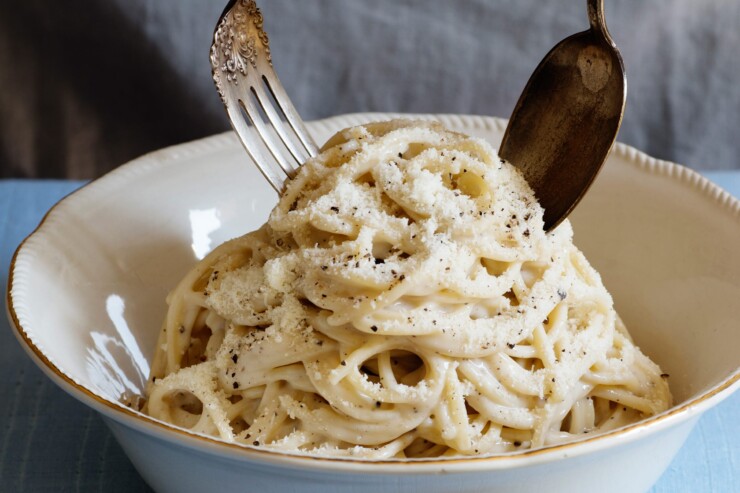
Why You’ll Love This Recipe
Because seriously, this is how Cacio e Pepe pasta should be made. A lot of times, it’s too soupy or kinda dry. But Leonardo’s technique makes a super delicious dish (essentially grown-up mac-and-cheese!) every time.
We love Leonardo Vignoli’s saucy version at Cesare al Casaletto. He uses ice in a hot pan to obtain a creamy sauce, but we have adapted his recipe to obtain more consistent results in a home kitchen.
This pasta is one of the most classic Rome foods. So, if you can be in Rome eating it in real life, the next best thing is to make it yourself. Also, it’s super simple to make because the two main ingredients, besides pasta, are Cacio cheese and pepper. It can’t get any simpler than that.
Recipe Ingredients
These are the ingredients that you’ll need to make this Cacio e Pepe pasta recipe:
For The Pasta:
- Sea salt
- Spaghetti or tonnarelli
For The Cacio e Pepe Pasta Sauce:
- Pecorino Romano cheese
- Freshly ground black pepper
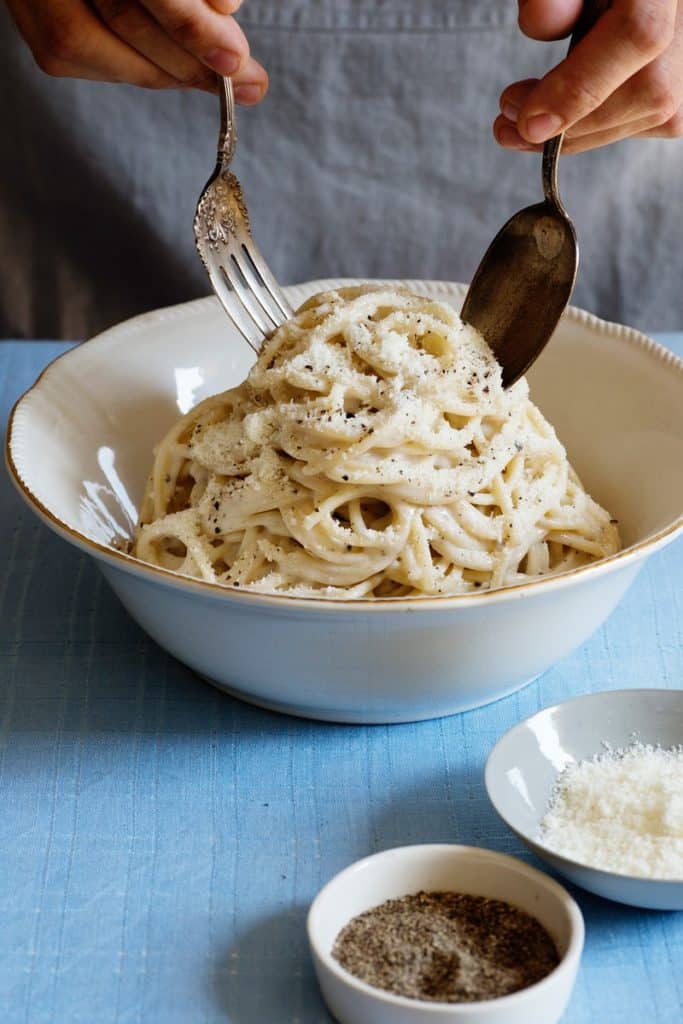
How To Make This Recipe
Making Cacio e Pepe pasta is straightforward, but you’re essentially making a cheese paste, and it can quickly go from okay to blah if you don’t do it correctly. Follow these instructions, and after doing it a couple of times, it’ll be an old hat!
- Cook The Pasta: Bring a medium pot of water to a rolling boil over high heat. Once the water boils, salt the water generously. When the salt has dissolved, add the pasta and cook until al dente.
- Make The Cacio E Pepe Sauce Base: Meanwhile, in a large bowl, combine the Pecorino Romano, the pepper, and a small ladle of pasta cooking water. Using the back of a large wooden spoon, mix vigorously and quickly to form a paste.
- Add The Pasta To The Sauce: When the pasta is cooked, use a large strainer, a spider strainer, or tongs to remove it all from the cooking water and quickly add it to the sauce in the bowl, keeping the cooking water boiling on the stove.
Toss vigorously, adding the hot pasta cooking water a tablespoon or two at a time as necessary to melt the cheese and to obtain a juicy sauce that completely coats the pasta. - Serve The Cacio e Pepe: Plate and sprinkle each portion with some of the remaining Pecorino Romano and pepper to taste. Serve immediately.

Tips To Make Cacio e Pepe
Finely grated high-quality Pecorino Romano cheese and very hot water are essential to a smooth sauce, while fresh, coarsely ground black pepper gives flavor and texture.
However, speed is the most important component of a flawless cacio e Pepe. If the water cools before melting the cheese, the sauce will clump.
Here are our tips to make the perfect spaghetti cacio e Pepe:
- Go For Quality: Use great-quality Pecorino cheese, black peppercorns that are freshly ground in a mortar and pestle or a grinder, and high-quality pasta. If Pecorino Romano is too salty for you, you could make it with half Parmigiano-Reggiano and half Pecorino. Of course, that will not be traditional, though!
- Prepare: Have all ingredients mise-d, measured, and prepped before cooking. That goes for equipment, serving plates, and your diners, too, FYI.
- Grate The Pecorino Cheese: The best way to get the sauce to work is to use the small holes of a box grater or a microplane and grate (not shred!) the cheese. The finer ground cheese will incorporate much easier than the long shreds.
- Use A Long Pasta: Traditionally, this pasta is made with spaghetti or tonnarelli noodles but bucatini or linguine would work in a pinch.
- Keep The Ratio: Keep the ratios as they are in this recipe. If you use too much pasta, the sauce will be inadequate.
- Use A Smaller Pot: We agree with our friends at Serious Eats that anytime you’re making a pasta sauce with very few ingredients (ahem, Carbonara, Pasta al Limone, we’re looking at you), it’s key to boil the pasta in a smaller pot or even a large skillet. The idea being that that your pasta water will get extra starchy and more starch equals a better-emulsified sauce.
- Skip Olive Oil And Butter: Many American recipes call for starting the recipe with butter or olive oil, but that is not the traditional way to make Cacio e Pepe.The technique here is more classic, but,to be honest, it can be tricky the first few times you make it.
- Cook The Pasta Al Dente: Make sure you cook the pasta a few minutes short of the package instructions, as you want it to be al dente. In fact, in Rome, you’ll even see people cook pasta to “al Chiodo” or nail, meaning even
- Whisk Then Spoon: Use a whisk the first few times you make it, and then move onto a wooden spoon once you’ve got the technique down. The key is to stir the sauce base vigorously so you have a smooth paste.
Ok, that’s it. Now, go stock up on all your cooking essentials, head into the kitchen, make this, and share it with us by tagging @saltandwind and #swsociety on social!
Frequently Asked Questions About Cacio E Pepe Pasta
“Cacio” is the Roman dialect word for Pecorino Romano, a sheep’s-milk cheese made in the Lazio region since ancient times, and “pepe” translates to pepper.
So “cacio e pepe” (pronounced cah-cho eh pep-eh) means “cheese and pepper” about the pasta’s two star ingredients.
Like carbonara, Cacio e Pepe is a newcomer to the Roman repertoire, first appearing in the mid-twentieth century.
Cacio e Pepe pasta and Gricia, Carbonara, and Amatriciana are among the “four pastas of Rome.” If you haven’t had this dish before, it’s bold and unapologetic with tangy saltiness and sharp pepperiness, and when made right, it’s a simple lesson that tastes like refined mac and cheese!
To make a classic Cacio e Pepe recipe, a homemade pasta dough recipe is tossed with an emulsified sauce of Pecorino Romano cheese and black pepper bound by starchy pasta cooking water. Depending on the cook, the results range from insipidly dry to creamy.
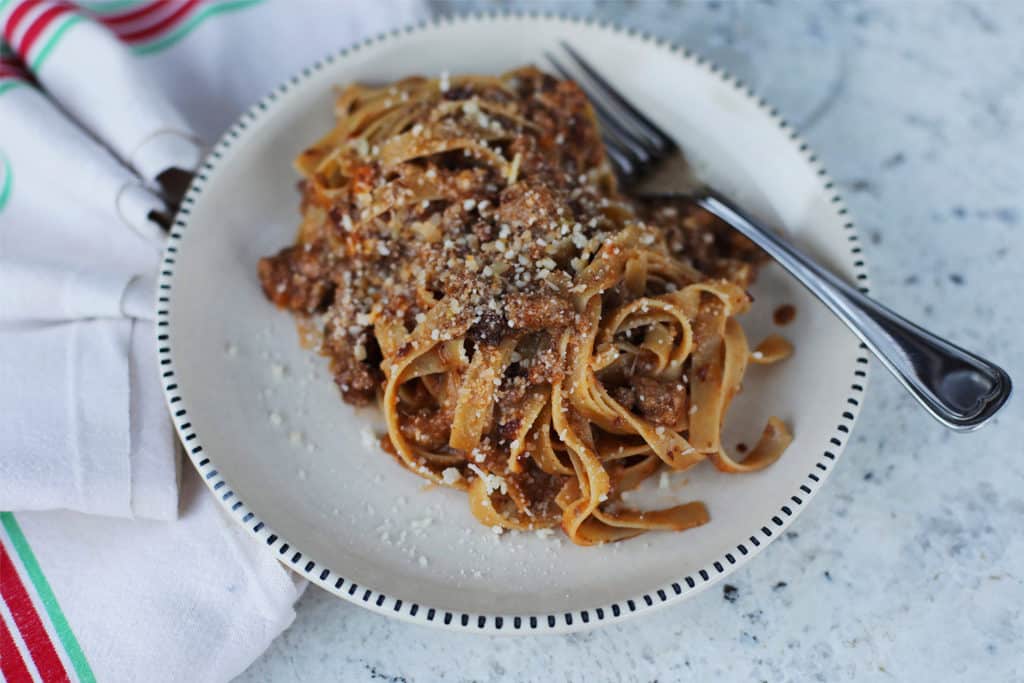
Classic Italian Pasta Recipes
Want to cook up all the classics? Check out these other classic pasta recipes our readers adore:

Rome Travel Guide
Thinking of heading to Rome shortly? Check out our Lazio Travel Guide which covers all the essential travel tips on Rome and other parts of the region.
Get A Personalized Travel Itinerary
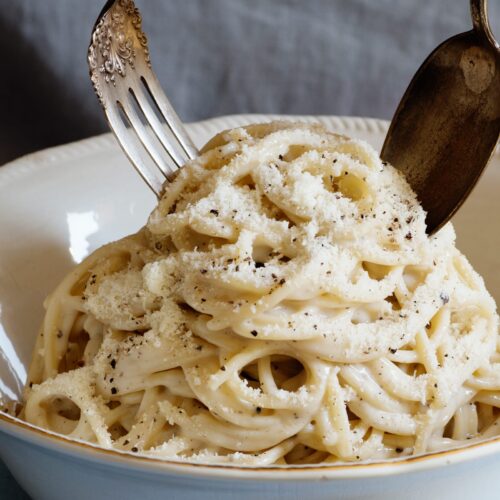
{Cacio e Pepe} Leonardo Vignoli’s Cacio e Pepe Pasta Recipe
Equipment
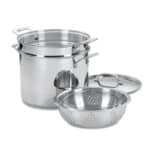
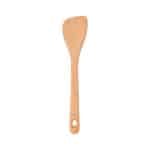
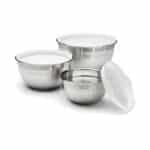
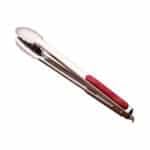
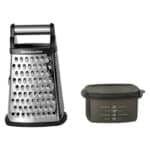
Ingredients
For The Pasta:
- Sea salt
- 1 pound spaghetti or tonnarelli (use gluten free pasta to make it gluten free)
For The Cacio e Pepe Pasta Sauce:
- 2 cups finely grated Pecorino Romano cheese
- 2 teaspoons Freshly ground black pepper plus more to taste
Instructions
- Cook The Pasta: Bring a medium pot of water to a rolling boil over high heat. Once the water boils, salt the water generously. When the salt has dissolved, add the pasta and cook until al dente (about 1-2 minutes short or the package directions).
- Make The Cacio E Pepe Sauce Base: Meanwhile, in a large bowl, combine 1 1/2 cups of the Pecorino Romano, the pepper, and a small ladle of pasta cooking water. Using the back of a large wooden spoon, mix vigorously and quickly to form a paste.
- Add The Pasta To The Sauce: When the pasta is cooked, use a large strainer, a spider strainer, or tongs to remove it all from the cooking water and quickly add it to the sauce in the bowl, keeping the cooking water boiling on the stove. Toss vigorously, adding the hot pasta cooking water a tablespoon or two at a time as necessary to melt the cheese and to obtain a juicy sauce that completely coats the pasta.
- Serve The Cacio e Pepe: Plate and sprinkle each portion with some of the remaining Pecorino Romano and pepper to taste. Serve immediately.